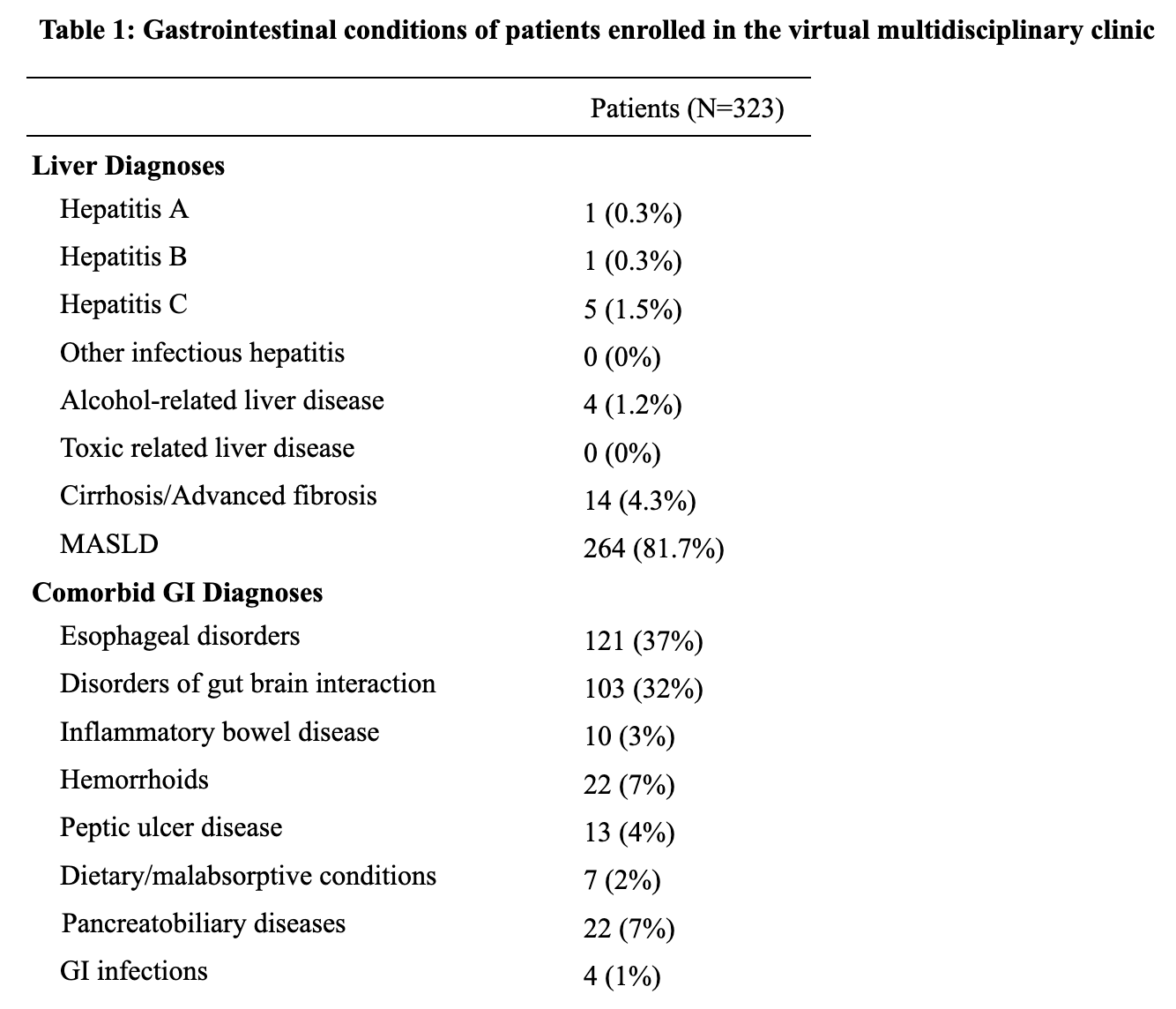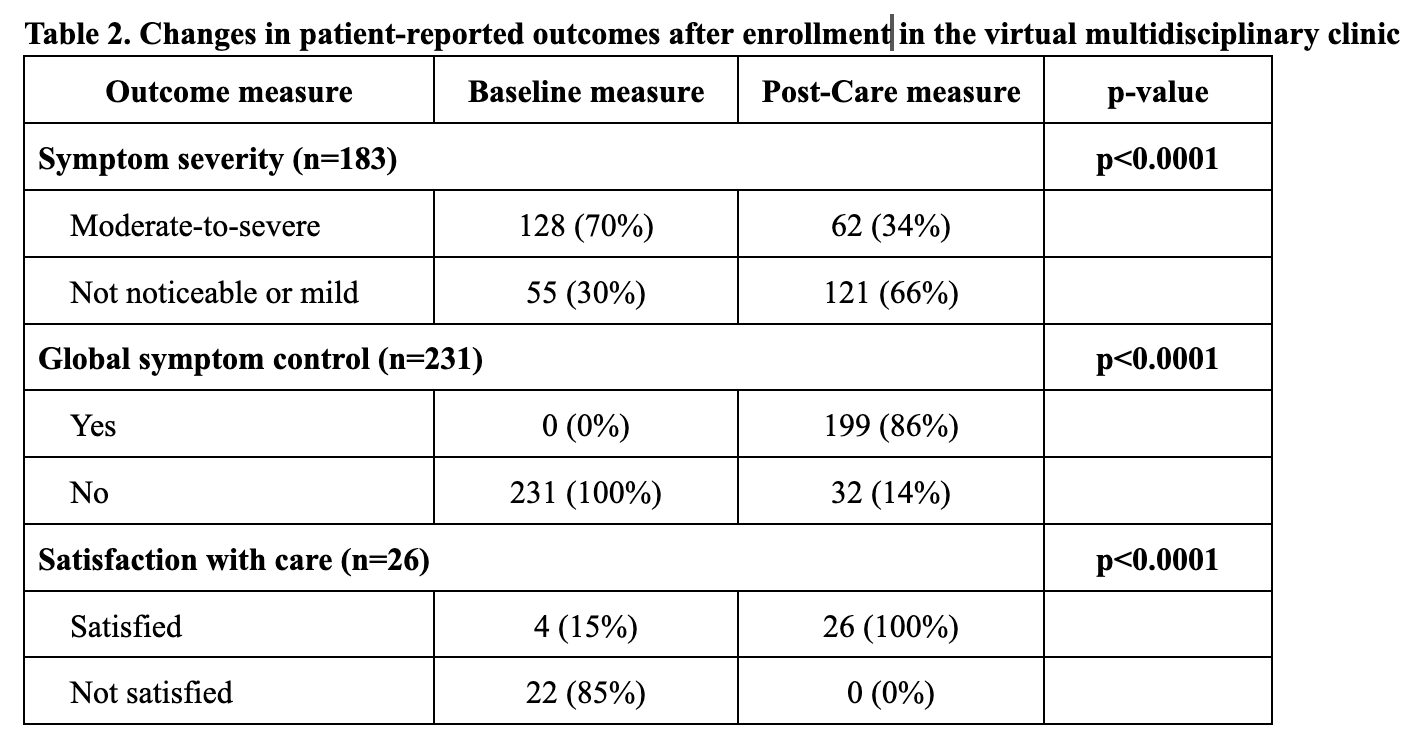Sunday Poster Session
Category: Liver
P1629 - Transforming Liver Care: Patient-Reported Outcomes From a Virtual Multidisciplinary Gastrointestinal Clinic
Sunday, October 26, 2025
3:30 PM - 7:00 PM PDT
Location: Exhibit Hall
- SB
Sameer Berry, MD
NYU Langone Health
New York, NY
Presenting Author(s)
Sameer Berry, MD1, Sanskriti Varma, MD2, Chamara Basnayake, MBBS3, Jeffrey Berinstein, MD, MS4, Walter Chan, MD, MPH, FACG5, John Allen, MD, MBA4, Joseph Ahn, MD6
1NYU Langone Health, New York, NY; 2Massachusetts General Hospital, Somerville, MA; 3St Vincent’s Hospital Melbourne – Department of Gastroenterology, Melbourne, Victoria, Australia; 4University of Michigan Health, Ann Arbor, MI; 5Brigham and Women's Hospital, Boston, MA; 6Mayo Clinic Health System, Rochester, MN
Introduction: Chronic liver diseases affect approximately 1 in 3 Americans and are a growing contributor to healthcare utilization and morbidity. Patients with liver disease experience complex challenges, including polypharmacy and prolonged wait times for specialty care, averaging 71 days to see a hepatologist as of 2019. While multidisciplinary care models have shown promise in liver disease management, implementation in fully virtual settings remains limited. We evaluated the impact of a virtual multidisciplinary clinic on clinical engagement and patient outcomes among patients with liver diseases.
Methods: This is a prospective observational study of commercially insured adults with a primary diagnosis of liver disease, who enrolled in a virtual, multidisciplinary GI clinic between 3/2021-5/2025. Patients receiving ≥1 year of care were included in descriptive analyses of clinical engagement. All patients completed ≥4 clinical visits and provided self-reported outcomes at baseline and after the most recent visit, including symptom severity (of any GI-related symptom), global symptom control, and satisfaction. Paired pre-post comparisons were made using McNemar’s Chi-square tests.
Results: We included 323 patients (59% female with a mean age of 46±11 yrs). The most common liver diagnoses were metabolic dysfunction-associated steatotic liver disease (82%) followed by cirrhosis/advanced fibrosis (4.3%), with new GI/liver diagnoses made in 63% of patients (Table 1). 33% had a comorbid mental health or behavioral disorder. The average time to first appointment was 6 days. Enrolled patients completed a mean of 9 visits (range 2-46) and exchanged a mean of 60 messages (range 3-591) with the care team. Most patients received care from dietitians (88%) and GI psychologists (59%). Significant improvements were observed in symptom severity (n=183; 34% moderate-to-severe post-care vs 70% baseline; p< 0.0001), global symptom control (n=231; 86% post-care vs 0% baseline; p< 0.0001), and satisfaction with care (n=26; 100% satisfied post-care vs 15% baseline; p< 0.0001, Table 2).
Discussion: This virtual multidisciplinary GI care model demonstrated high clinical engagement and significant improvements in patient-reported outcomes among individuals with liver diseases. These findings underscore the feasibility and clinical effectiveness of integrated virtual care in managing hepatic disorders, a population that faces barriers to traditional in-person care.

Figure: Values shown as N (%) or mean (standard deviation) for patients with documented diagnoses. Patients can have more than one condition and be classified multiple times. Diagnosis data is reflective of members who remained engaged in the clinic for at least 1 year.

Figure: Symptom severity (any GI symptom) was assessed using a non-validated clinical questionnaire developed by Oshi Health for internal clinical use, and measured in the following categories: not noticeable, mild, moderate, severe. For the purposes of analyses, responses were grouped into “moderate/severe” or “not noticeable/mild”.
Global symptom control was assessed using a non-validated clinical questionnaire developed by Oshi Health for internal clinical use and measured in the following categories: yes, no.
Satisfaction with care was measured using the validated Customer Satisfaction Survey in the following categories: very dissatisfied, dissatisfied, neutral, satisfied, very satisfied. For the purposes of analyses, responses were grouped into “satisfied” if patients reported “satisfied” or “very satisfied” and “not satisfied” if patients reported “neutral”, “dissatisfied”, or “very dissatisfied”.
Disclosures:
Sameer Berry: Oshi Health – Employee.
Sanskriti Varma: Oshi Health – Consultant.
Chamara Basnayake indicated no relevant financial relationships.
Jeffrey Berinstein indicated no relevant financial relationships.
Walter Chan indicated no relevant financial relationships.
John Allen indicated no relevant financial relationships.
Joseph Ahn indicated no relevant financial relationships.
Sameer Berry, MD1, Sanskriti Varma, MD2, Chamara Basnayake, MBBS3, Jeffrey Berinstein, MD, MS4, Walter Chan, MD, MPH, FACG5, John Allen, MD, MBA4, Joseph Ahn, MD6. P1629 - Transforming Liver Care: Patient-Reported Outcomes From a Virtual Multidisciplinary Gastrointestinal Clinic, ACG 2025 Annual Scientific Meeting Abstracts. Phoenix, AZ: American College of Gastroenterology.
1NYU Langone Health, New York, NY; 2Massachusetts General Hospital, Somerville, MA; 3St Vincent’s Hospital Melbourne – Department of Gastroenterology, Melbourne, Victoria, Australia; 4University of Michigan Health, Ann Arbor, MI; 5Brigham and Women's Hospital, Boston, MA; 6Mayo Clinic Health System, Rochester, MN
Introduction: Chronic liver diseases affect approximately 1 in 3 Americans and are a growing contributor to healthcare utilization and morbidity. Patients with liver disease experience complex challenges, including polypharmacy and prolonged wait times for specialty care, averaging 71 days to see a hepatologist as of 2019. While multidisciplinary care models have shown promise in liver disease management, implementation in fully virtual settings remains limited. We evaluated the impact of a virtual multidisciplinary clinic on clinical engagement and patient outcomes among patients with liver diseases.
Methods: This is a prospective observational study of commercially insured adults with a primary diagnosis of liver disease, who enrolled in a virtual, multidisciplinary GI clinic between 3/2021-5/2025. Patients receiving ≥1 year of care were included in descriptive analyses of clinical engagement. All patients completed ≥4 clinical visits and provided self-reported outcomes at baseline and after the most recent visit, including symptom severity (of any GI-related symptom), global symptom control, and satisfaction. Paired pre-post comparisons were made using McNemar’s Chi-square tests.
Results: We included 323 patients (59% female with a mean age of 46±11 yrs). The most common liver diagnoses were metabolic dysfunction-associated steatotic liver disease (82%) followed by cirrhosis/advanced fibrosis (4.3%), with new GI/liver diagnoses made in 63% of patients (Table 1). 33% had a comorbid mental health or behavioral disorder. The average time to first appointment was 6 days. Enrolled patients completed a mean of 9 visits (range 2-46) and exchanged a mean of 60 messages (range 3-591) with the care team. Most patients received care from dietitians (88%) and GI psychologists (59%). Significant improvements were observed in symptom severity (n=183; 34% moderate-to-severe post-care vs 70% baseline; p< 0.0001), global symptom control (n=231; 86% post-care vs 0% baseline; p< 0.0001), and satisfaction with care (n=26; 100% satisfied post-care vs 15% baseline; p< 0.0001, Table 2).
Discussion: This virtual multidisciplinary GI care model demonstrated high clinical engagement and significant improvements in patient-reported outcomes among individuals with liver diseases. These findings underscore the feasibility and clinical effectiveness of integrated virtual care in managing hepatic disorders, a population that faces barriers to traditional in-person care.

Figure: Values shown as N (%) or mean (standard deviation) for patients with documented diagnoses. Patients can have more than one condition and be classified multiple times. Diagnosis data is reflective of members who remained engaged in the clinic for at least 1 year.

Figure: Symptom severity (any GI symptom) was assessed using a non-validated clinical questionnaire developed by Oshi Health for internal clinical use, and measured in the following categories: not noticeable, mild, moderate, severe. For the purposes of analyses, responses were grouped into “moderate/severe” or “not noticeable/mild”.
Global symptom control was assessed using a non-validated clinical questionnaire developed by Oshi Health for internal clinical use and measured in the following categories: yes, no.
Satisfaction with care was measured using the validated Customer Satisfaction Survey in the following categories: very dissatisfied, dissatisfied, neutral, satisfied, very satisfied. For the purposes of analyses, responses were grouped into “satisfied” if patients reported “satisfied” or “very satisfied” and “not satisfied” if patients reported “neutral”, “dissatisfied”, or “very dissatisfied”.
Disclosures:
Sameer Berry: Oshi Health – Employee.
Sanskriti Varma: Oshi Health – Consultant.
Chamara Basnayake indicated no relevant financial relationships.
Jeffrey Berinstein indicated no relevant financial relationships.
Walter Chan indicated no relevant financial relationships.
John Allen indicated no relevant financial relationships.
Joseph Ahn indicated no relevant financial relationships.
Sameer Berry, MD1, Sanskriti Varma, MD2, Chamara Basnayake, MBBS3, Jeffrey Berinstein, MD, MS4, Walter Chan, MD, MPH, FACG5, John Allen, MD, MBA4, Joseph Ahn, MD6. P1629 - Transforming Liver Care: Patient-Reported Outcomes From a Virtual Multidisciplinary Gastrointestinal Clinic, ACG 2025 Annual Scientific Meeting Abstracts. Phoenix, AZ: American College of Gastroenterology.
